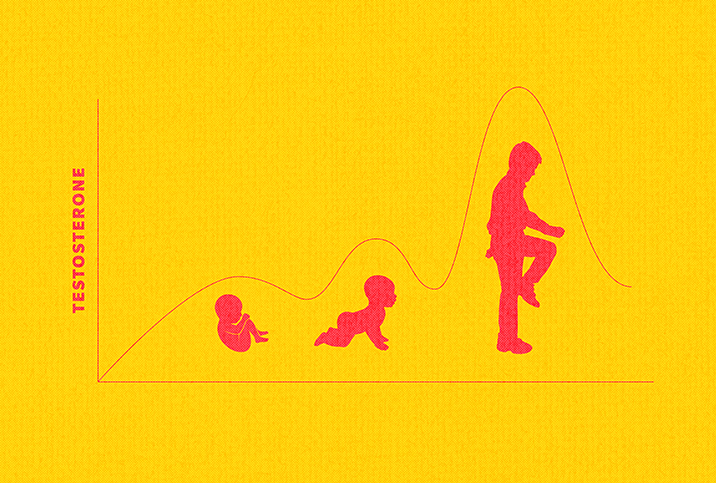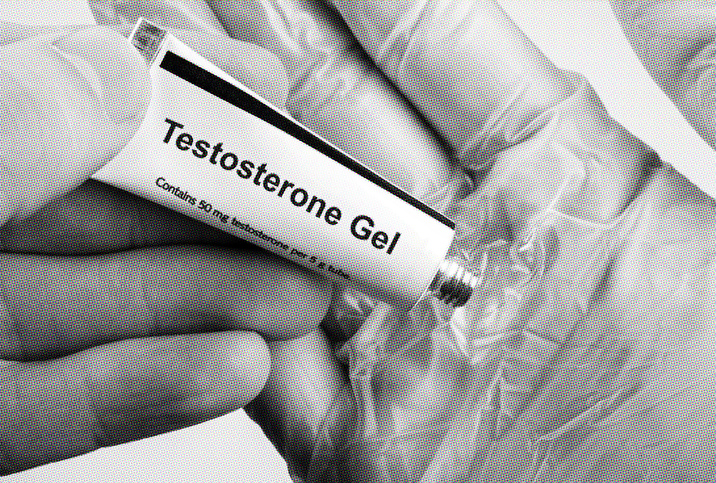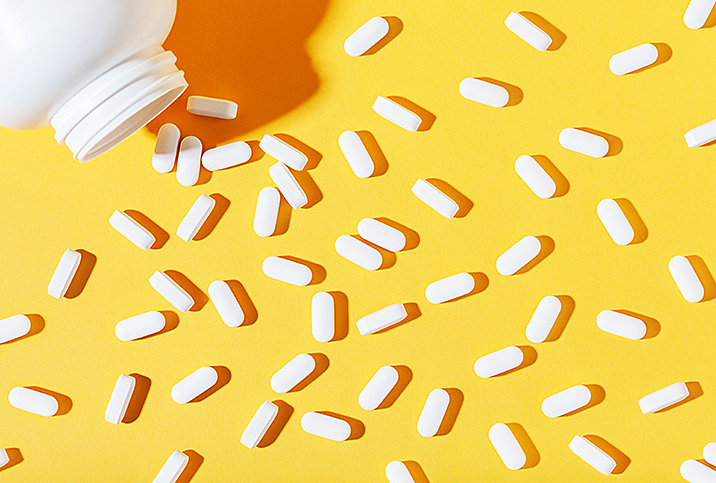5 Things We Bet You Don't Know About Testosterone Production

I have this image in my head about hormone production. I'm pretty sure it's not accurate, but that's largely because it stems from my experience of attending public school and receiving sex education from whichever teacher was leading class that day in my extremely poor school district.
The image looks something like this: The pituitary gland sits somewhere in the area of the back-end base of my brain. It is Pituitary: Lord of Hormones. According to my memory of middle school sex education, the pituitary directs and distributes hormones with sole authority in the matter, but a collaborative component is involved. The gland is emperor in all matters concerning reproduction, adrenaline and a whole array of other functions that go on in the body and make us feel the way we feel.
As it turns out, the teacher wasn't so wrong, after all.
As it pertains to this particular discussion, the pituitary gland isn't really our primary focus, though. Instead, we're concerned with one of the hormones produced as a result of signals the pituitary sends to the testes.
Today, class, we are talking about testosterone production.
1. Testosterone isn't all about the testicles
Many people are surprised to find out testosterone comes from more places in the body than solely the testicles, said Wael Almajed, M.D., a urologist who holds a subspecialization in sexual medicine and is conducting research affiliated with Tulane University in New Orleans.
"A lot of people think it's primarily from the testicles, but the adrenal gland can also secrete minor amounts of testosterone," he said.
While both men and women produce testosterone, from the testes and ovaries, respectively, they also produce this hormone from the adrenal gland. The portion of human testosterone that comes from the adrenal gland is significantly less than what comes from the sexual organs. Androgens, a family of hormones in which testosterone is included, come from the outer layer or cortex of the adrenal glands. The inner layer, or medulla, is responsible for producing epinephrine, also known as adrenaline.
2. Lifestyle is one of the biggest factors in 'T' production
With so many supplements and testosterone-based products available, people may forget that basic lifestyle factors are among the biggest elements in testosterone production.
Nearly everything you do can play into your testosterone levels. How you eat, work and sleep are all factors. Your sexual health and practices can be factors. Even how much stress you feel surrounding your testosterone levels can affect your testosterone production.
The point is not to become obsessive about your diet, exercise and other routines, as this stress can negatively impact the entire body, and can especially affect those systems that become impaired when cortisol levels rise and/or remain consistently high. While exercising and eating healthy are always good ideas, turning these activities into manic obsessions is likely to create problems that include, but are not limited to, those associated with testosterone production.
Neglect of your general health can be a testosterone problem, as well.
3. Testosterone can become estrogen
When people are overweight or obese, excess fat can cause their testosterone to be converted into estrogen, Almajed said.
"This could be responsible for having gynecomastia that is associated with obesity, so an increase in breast mass," he added.
Gynecomastia, the medical term for enlarged breasts in men, is commonly caused by an imbalance between estrogen and testosterone. Gynecomastia correlates to several other health problems and can cause a significant drop in confidence for men. This blow to confidence, along with the reduction of testosterone levels, is often linked to erectile dysfunction (ED).
"Some people think that losing weight can actually enhance the testosterone effect in the body, which includes increasing muscle mass, improving bone health and so on," Almajed said. "And also improving sexual performance and desire."
Men too often think libido or fertility issues can be traced to low testosterone. In some cases, this might be true, but it would be a mistake to pursue testosterone supplements or over-the-counter treatments without consulting your doctor first.
Healthy levels of natural testosterone production can be correlated to higher sex drive and improved fertility rates, but exogenous testosterone—that taken through supplements—can undermine the reproductive processes associated with hormone and sperm production.
Almajed said high natural testosterone levels in otherwise healthy men can equate to higher sperm volumes, as well as improved sperm motility. In overweight people, as well as those with low testosterone for one reason or another, fertility can be affected in terms of spermatogenesis and sperm production.
4. Testosterone gets too much credit
There's a popular notion that many men's health problems have to do solely or largely with low testosterone (low-T). This is the same notion that drives the sale of supplements, products and seminars aimed at revitalizing male virility and overall health. Even though many of the health problems men experience might be traced to testosterone, it's often just as likely the problem lies somewhere else and testosterone production is perfectly fine despite presumptions to the contrary.
One urologist said men come to the doctor's office far too often looking at testosterone as the culprit or cure for their conundrums.
"This whole notion of testosterone being the savior for a lot of symptoms for men, whether it's fatigue or decreased libido or erectile dysfunction, it's not usually as simple as just replacement of testosterone," said Matthew Mutter, M.D., a New Orleans–based men's health specialist. "So it's really common for guys to come in with a whole host of symptoms and they think that the testosterone is some kind of magic bullet. And it just doesn't work that way."
Even though many of the health problems men experience might be traced to testosterone, it's often just as likely the problem lies somewhere else.
In fact, a lot of the problems men associate with testosterone might come right back to basic lifestyle. Mutter said many men with complaints about testosterone production are simply dealing with exhaustion, depression, lack of sleep or other general health concerns that tend to get overlooked in the average American life.
"A lot of these men can sometimes get frustrated because all they want is testosterone, but it's just not really what they need," said Mutter, who emphasized the importance of addressing these inquiries from a mental health perspective as well as a physical health viewpoint. "As physicians, we'd be doing the patient a disservice if all we did was just send them off with a testosterone prescription and not really think about other things."
5. Testosterone production peaks three times
Something to consider about testosterone production is that it really only spikes three times throughout the course of a human life.
First, testosterone peaks in utero during embryogenesis.
"The embryo will have a high testosterone production during probably between the first and second trimester," Almajed said. "The benefit of this testosterone production is to promote the formation of the male genitalia—so the penis, the testicles and the scrotum—and to prevent female organ production. So it's one of the factors that helps to differentiate males from females during embryogenesis."
The second surge of testosterone happens in the first week of life and is sometimes considered responsible for the development of male-distinguishing personality traits. And, of course, the third spike in testosterone production occurs during puberty.
If you remember that testosterone is produced in high amounts infrequently during the course of your life, it really should ease any concerns about low testosterone during adulthood.
Men often think of themselves as they were as adolescents and young men, pumping full of testosterone. But in reality, testosterone production is a nominal event during most of their lifetime. During childhood, in between that first week of life and puberty, testosterone levels are practically nonexistent.
Fortunately, finding out where you stand with testosterone levels and reproductive health is a little bit easier than trying to recall your sixth-grade sexual health lecture. All you have to do is go to your doctor and ask, and they'll be able to tell you everything you need to know about how your testosterone production may or may not be affecting your life.


















